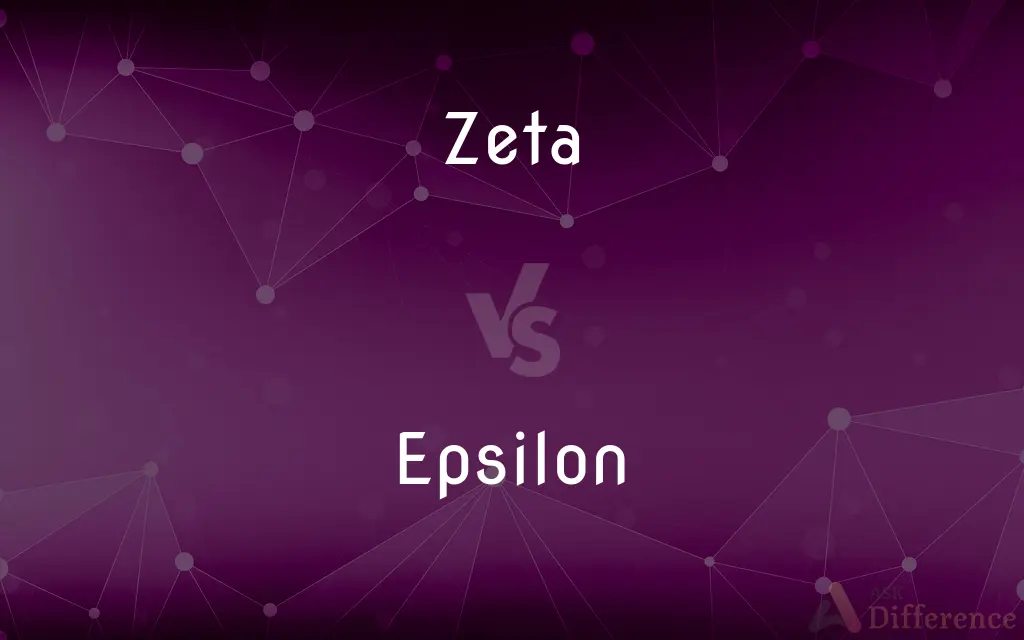Zeta vs. Epsilon — What's the Difference?
By Urooj Arif & Maham Liaqat — Updated on April 16, 2024
Zeta and Epsilon are the sixth and fifth letters of the Greek alphabet, respectively, commonly used in mathematics and science.

Difference Between Zeta and Epsilon
Table of Contents
ADVERTISEMENT
Key Differences
Zeta, being the sixth letter of the Greek alphabet, is often symbolized as Ζ in uppercase and ζ in lowercase. Whereas Epsilon, the fifth letter, is represented as Ε in uppercase and ε in lowercase.
In terms of phonetics, Zeta is typically pronounced as 'zee-ta' in modern Greek, resembling the 'z' sound in "maze". On the other hand, Epsilon is pronounced 'ep-see-lon' and sounds like the 'e' in "met".
In mathematical contexts, zeta is famously known for its use in the Riemann Zeta function, a critical element in number theory and complex analysis. Conversely, Epsilon is widely used to denote an arbitrarily small positive quantity, especially in limits and proofs involving continuity.
In science, Zeta can denote coefficients or variables in equations, particularly in physics and engineering. Epsilon, however, is more versatile, representing everything from electric permittivity in physics to strain in engineering.
Despite their different uses and positions in the alphabet, both zeta and epsilon are integral to the lexicon of scientific and mathematical notation, each serving unique and often crucial roles.
ADVERTISEMENT
Comparison Chart
Alphabet Position
6th letter
5th letter
Greek Symbol
Ζ (uppercase) ζ (lowercase)
Ε (uppercase) ε (lowercase)
Pronunciation
'zee-ta'
'ep-see-lon'
Common Usage
Riemann Zeta function in mathematics
Represents small quantities in mathematics
Phonetic Sound
Similar to 'z' in "maze"
Similar to 'e' in "met"
Compare with Definitions
Zeta
The sixth letter of the Greek alphabet.
In the Greek numeral system, Zeta represents the number 7.
Epsilon
Indicates strain in materials science.
Epsilon measures the degree of deformation experienced by a material under stress.
Zeta
Used in mathematics to denote the Riemann Zeta function.
The Riemann Zeta function is critical for understanding the distribution of prime numbers.
Epsilon
The fifth letter of the Greek alphabet.
In the system of Greek numerals, Epsilon has a value of 5.
Zeta
Symbol in scientific formulas, often representing coefficients.
Zeta potential is important in the study of stability in colloids.
Epsilon
Symbolizes permittivity in physics.
The constant ε0 is known as the vacuum permittivity.
Zeta
Used to denote damping ratios in engineering.
The zeta value helps determine how oscillations in a system decay.
Epsilon
Represents a very small number in mathematics, especially in calculus.
Epsilon is used to define the concept of limits in calculus.
Zeta
Represents the sixth item in a series.
Zeta was the designation for the sixth experiment in the series.
Epsilon
Used to denote error terms in statistics.
Epsilon represents the error components in regression analysis.
Zeta
Zeta (UK: , US: ; uppercase Ζ, lowercase ζ; Ancient Greek: ζῆτα, Demotic Greek: ζήτα, classical [d͡zɛ̌:ta] or [zdɛ̌:ta] zē̂ta; Modern Greek: [ˈzita] zíta) is the sixth letter of the Greek alphabet. In the system of Greek numerals, it has a value of 7.
Epsilon
Epsilon (UK: , US: ; uppercase Ε, lowercase ε or lunate ϵ; Greek: έψιλον) is the fifth letter of the Greek alphabet, corresponding phonetically to a mid front unrounded vowel /e/. In the system of Greek numerals it also has the value five.
Zeta
The sixth letter of the Greek alphabet. See Table at alphabet.
Epsilon
The fifth letter of the Greek alphabet. See Table at alphabet.
Zeta
The sixth letter of the modern Greek alphabet (Ζ, ζ) preceded by epsilon (Ε, ε) and followed by eta, (Η, η); or the seventh letter in the ancient Greek alphabet, in which it is preceded by digamma (Ϝ, ϝ)
Epsilon
The name for the fifth letter of the Greek alphabet, ε or Ε, preceded by delta (Δ, δ) and followed by zeta (Ζ, ζ).
Zeta
(mathematics) A mathematical function formally known as the Riemann zeta function.
Zeta of 3 is irrational
Epsilon
(phonetics) In IPA, the phonetic symbol ɛ that represents the open-mid front unrounded vowel.
Zeta
A Greek letter [
Epsilon
(mathematics) An arbitrarily small quantity.
Zeta
The 6th letter of the Greek alphabet
Epsilon
(colloquial) A small child.
Epsilon
Something negligible or insignificant.
Yes, we have to convert all the symbol names to upper case at startup, but that’s epsilon.
Epsilon
(finance) The percentage change in an option value with respect to the underlying dividend yield.
Epsilon
The 5th letter of the Greek alphabet
Common Curiosities
How do Zeta and Epsilon differ in their Greek numeral system value?
Zeta corresponds to 7, while Epsilon corresponds to 5 in the Greek numeral system.
What is Zeta used for in mathematics?
Zeta is primarily used in the Riemann Zeta function, which is essential in number theory.
What does Epsilon represent in mathematics?
Epsilon typically represents an arbitrarily small positive number, crucial in the definition of limits.
What is the significance of the Zeta potential in science?
The Zeta potential indicates the degree of repulsion between particles in a colloid, important for understanding stability.
How are Zeta and Epsilon used in engineering?
Zeta often represents damping ratios, while Epsilon can denote strain or small changes in measurements.
Can you explain the use of Epsilon in physics?
Epsilon often denotes permittivity, which is a measure of how much electric field is reduced within a medium.
Why is the Riemann Zeta function important?
It is crucial in understanding the distribution of prime numbers and has implications in other areas of mathematics.
How does the usage of Epsilon in calculus enhance understanding?
It helps in precisely defining the concept of limits, which is fundamental to calculus.
What are some scientific applications of Epsilon?
Epsilon is used across disciplines like physics, engineering, and statistics for various purposes including electric fields and error measurement.
What are common fields of study where Zeta is used?
Zeta is used in mathematics, physics, and engineering, particularly in dynamics and fluid mechanics.
How do the pronunciations of Zeta and Epsilon differ?
Zeta sounds like 'zee-ta', while Epsilon is pronounced 'ep-see-lon'.
Are Zeta and Epsilon related in any symbolic way beyond their alphabetic sequence?
No, they are distinct in their uses and symbolic meanings in various scientific and mathematical contexts.
How do the representations of Zeta and Epsilon affect practical applications?
Their representations as variables or coefficients are crucial for accurately describing and solving scientific and mathematical problems.
What roles do Zeta and Epsilon play in statistical models?
Zeta may be used to model damping in physical systems, whereas Epsilon often models error terms in statistical analyses.
What is the educational importance of understanding Zeta and Epsilon?
Knowledge of these symbols is essential for students and professionals in mathematics, physics, and engineering.
Share Your Discovery

Previous Comparison
Blab vs. Blurt
Next Comparison
Tendinopathy vs. EnthesopathyAuthor Spotlight
Written by
Urooj ArifUrooj is a skilled content writer at Ask Difference, known for her exceptional ability to simplify complex topics into engaging and informative content. With a passion for research and a flair for clear, concise writing, she consistently delivers articles that resonate with our diverse audience.
Co-written by
Maham Liaqat














































